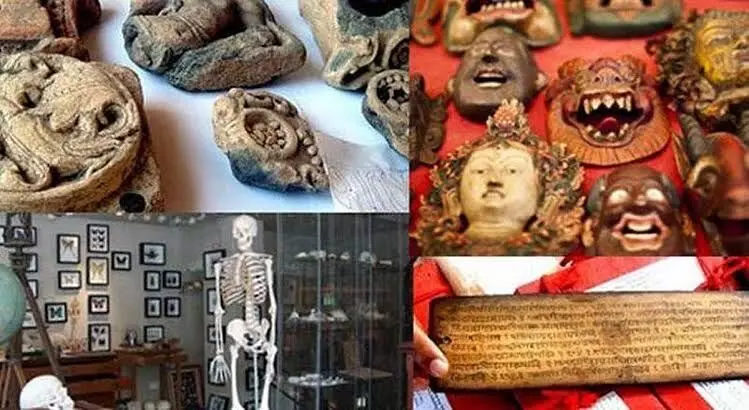Have you heard about toilet museum? Check out
Here are some of India’s archaeological galleries that have remained unknown to public
By Anoushka Caroline Williams
Have you heard about toilet museum? Check out
Hyderabad: India is home to some of the world’s oldest civilizations and largest collections of art, craft, and history.
But beyond the grand national museums and archaeological galleries, there exists a fascinating network of unusual museums that preserve stories of everyday life, forgotten crafts, and even the quirkiest aspects of culture.
Here are some that remain largely unknown to the wider public.
1. Sulabh International Museum of Toilets – New Delhi
Sanitation may not sound like the subject of a museum, but the Sulabh International Museum of Toilets challenges that assumption. It traces the history of toilets from 2500 BCE to the present day, with models ranging from ornate Victorian commodes to ancient chamber pots.
Dr. Bindeshwar Pathak, founder of Sulabh International, once explained the aim: “The idea was not just to display toilets, but to show how sanitation shaped civilizations.”
The museum also highlights how different societies handled public hygiene, underscoring its impact on health and dignity.
2. Human Brain Museum – Bengaluru
Nestled within the National Institute of Mental Health and Neurosciences (NIMHANS), the Human Brain Museum is among the very few in the world where visitors can view real, preserved human brains.
Established for educational purposes, it allows medical students, researchers, and curious visitors to understand brain anatomy and disorders.
3. Arna Jharna: The Desert Museum of Rajasthan – Jodhpur
Curated by folklorist Komal Kothari, this museum is dedicated to documenting the desert’s culture. One of its most unusual sections is the broom collection, hundreds of types of brooms used across India.
Kothari believed that “objects of daily use carry the memory of communities.” The museum also archives desert ecology, traditional music, and tools used in rural life, making it a living record of intangible heritage.
4. Kite Museum – Ahmedabad
Located inside the Sanskar Kendra, the Kite Museum celebrates Gujarat’s long association with kite flying, especially during the festival of Uttarayan.
The museum houses rare kites, some over 70 years old, made of paper, silk, and bamboo. It also displays Japanese kites, box kites, and even a 16-foot-long kite.
5. Bay Island Driftwood Museum – Andaman & Nicobar Islands
Set up by teacher Ruth Dey Roy in Kalpeni, the museum showcases driftwood sculptures naturally shaped by the sea. Collected from the shores of the Andaman Islands, these wooden pieces resemble animals, humans, and mythical forms.
This museum is a reminder of how environmental forces create art beyond human hands.
6. Indian Coffee Museum – Chikmagalur, Karnataka
For those who can’t start their day without caffeine, the Coffee Museum maintained by the Coffee Board of India tells the story of how coffee traveled from Ethiopia to Indian hills.
The exhibits include vintage roasters, grinders, and plantations’ history. The aroma of freshly ground beans accompanies visitors through interactive displays.
7. Partition Museum – Amritsar
While not “quirky” in the traditional sense, the Partition Museum is unusual for its deep emotional impact. It is dedicated to the memories of millions displaced during the 1947 Partition.
Letters, photographs, and oral histories bring alive one of the subcontinent’s most defining yet painful events.
8. Mayong Black Magic & Witchcraft Museum – Assam
The village of Mayong has long been associated with mystical practices. The museum here archives manuscripts, ritual objects, and oral traditions linked to magic and healing.
Locals view it as an attempt to protect their cultural heritage from being dismissed as mere superstition.
9. Revi Karunakaran Memorial Museum – Alappuzha, Kerala
This private museum is dedicated to one of Kerala’s prominent coir exporters. It is unusual for its vast personal collection of ivory, Swarovski crystals, and Tanjore paintings.
The museum is less about history and more about showcasing the tastes and lifestyles of Kerala’s elite business families in the 20th century.
10. Indian Museum of Sound and Music – Goa
Still growing in scope, this museum focuses on preserving India’s sound heritage, from rare instruments to early recordings. Visitors can hear folk sounds, temple bells, and archival vinyls.
Why These Museums Matter
Unusual museums are often born out of passion rather than state planning. They remind us that heritage is not just about kings and battles, but also about toilets, kites, brooms, or even driftwood. Each institution captures a slice of India that would otherwise fade into obscurity.
Do You Know?
India has over 1,000 registered museums, but many of its most fascinating ones are small, privately run, and rarely make it into tourist brochures. The next time you travel, you might stumble upon a museum that tells stories you never expected to hear.